Her boyfriend spanked her child. For five years, she’s been paying the price.
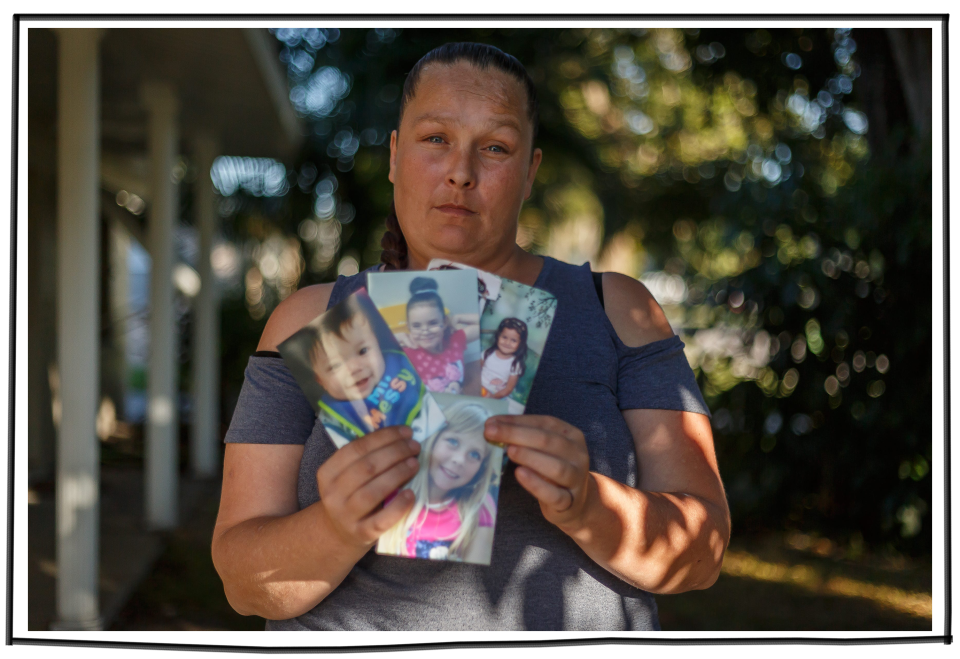
They came on a sweltering August evening in 2015, to Marion Phillips’ first-floor apartment in Bradenton, past the sanitation department, the juvenile detention center, Ramirez Auto, and a soup kitchen named Our Daily Bread. Four cops and an investigator with the Florida Department of Children and Families.
They were there to look at Abby’s leg.
Someone, maybe a teacher, had noticed it earlier that day: A multicolored bruise stretching across the back of the 6-year-old’s left thigh. Pablo Torres, Marion’s boyfriend, admitted he had spanked Abby with a belt while Marion was at work.
“You should never have done that,” Marion told him. “You should have taken her by the hand, sat her little butt down and I would have left work.”
The investigator ordered Marion, eight months pregnant, to pee in a cup with the bathroom door open. Then he told the three girls, wailing, that he needed to take them for a few hours.
“It’s going to be OK, baby girls,” Marion whispered.
They disappeared into the car.
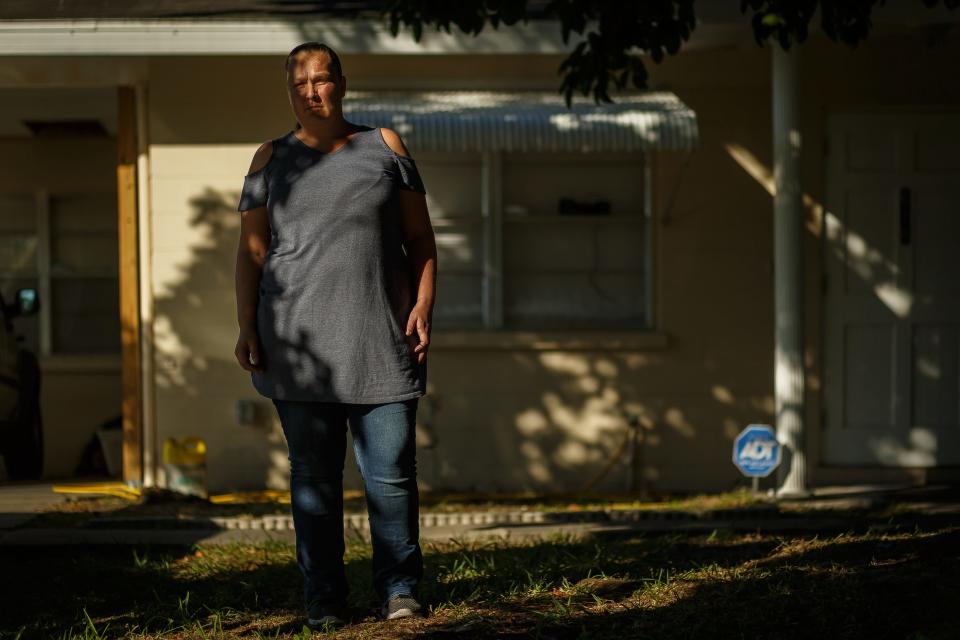
In the world of child welfare, some cases are clear-cut, with details that turn stomachs: gashes from whippings, babies shaken to death, horrific sexual abuse.
But far more common are the neglect cases, which make up the vast majority of child welfare investigations in Florida: The family living out of a van. The mother shaking an addiction to pills. The dad who spanks with a belt.
Marion’s was one of those cases. “Very workable and fixable,” said Brooke Robertson, then a supervisor at the local Guardian ad Litem office, a volunteer-based organization that looks out for the best interests of kids in the child welfare system.
Yet five years later, Marion is still fighting for custody of her children. USA TODAY followed the case for two years as part of an investigation into how Florida's child welfare system struggles to help mothers escape cycles of trauma and domestic violence, and often reaches instead for the most extreme solution — taking children away from women who have never been accused of abusing them.
About the series
This is an ongoing series about Florida’s child welfare system, which has taken an increasing number of kids into foster care without enough safe places to put them and has blamed victims - mostly mothers - when their children witness domestic violence. Reporters at USA TODAY spent more than a year analyzing data and interviewing families, insiders and advocates, revealing how overwhelmed state officials put nearly 200 children into the arms of abusers and how the system is stacked against battered women.
Contact the reporters
Pat Beall, pbeall@gannett.com
Michael Braga, mbraga@gannett.com
Daphne Chen, dchen@gannett.com
Suzanne Hirt, shirt@gannett.com
Josh Salman, jsalman@gannett.com
As she prepared to go to court the next day, Marion smoothed her hair into a ponytail and braided it tight, all the way down. Then she prayed: for luck, for mercy, for understanding.
“Some people have the most beautiful pasts and nothing ever happened to them,” Marion explained. “Some people have somewhat good pasts but also bad mixed in.
“Mine, the only thing good, was – is – my children.”
Struggling to connect
Marion had no criminal record to speak of. But the Department of Children and Families had been in her life plenty.
Over the years, the state’s concerns revolved around her longtime partner Jim Cullen’s drug problems and violent behavior, case records show. In 2006, the state took temporary custody of the couple's four oldest children after Jim tested positive for drugs. In 2012, Jim’s parents adopted the kids after accusing Jim and Marion of abandoning them, according to court records – a bitter custody battle that permanently soured their relationship.
Shortly afterward, Marion left Jim, rented a two-bedroom apartment in Bradenton and took a steady job at Family Dollar for $10 an hour. She also found Pablo. The landlord thought him “a good man.” The neighbors called him the “best thing that ever happened to her.”
Still, the Safe Children Coalition, the nonprofit contracted with DCF to oversee child welfare in the region, told Marion to get rid of him. In addition, they gave her a hefty but cookie-cutter case plan: complete a 26-week parenting course, attend domestic violence counseling and undergo a mental health evaluation.
Her girls — ages 4, 6 and 7 — were put in a group home run by the Salvation Army. Her infant son was sent to a foster home.
Marion bought a binder and a three-hole punch. She switched to the early-morning shift so she could be off by the time the kids were done with school. On a notepad decorated with ornaments and snowflakes, she carefully jotted down appointments, addresses and reminders:
When will mental health for children start?
Support payments from fathers?
And at the bottom: Food stamps??
“Marion started out as a doormat,” Robertson said. “Not having her own opinions, doesn’t really give eye contact, very submissive.”
In January 2016, to glowing reviews, a judge gave the girls back to Marion.
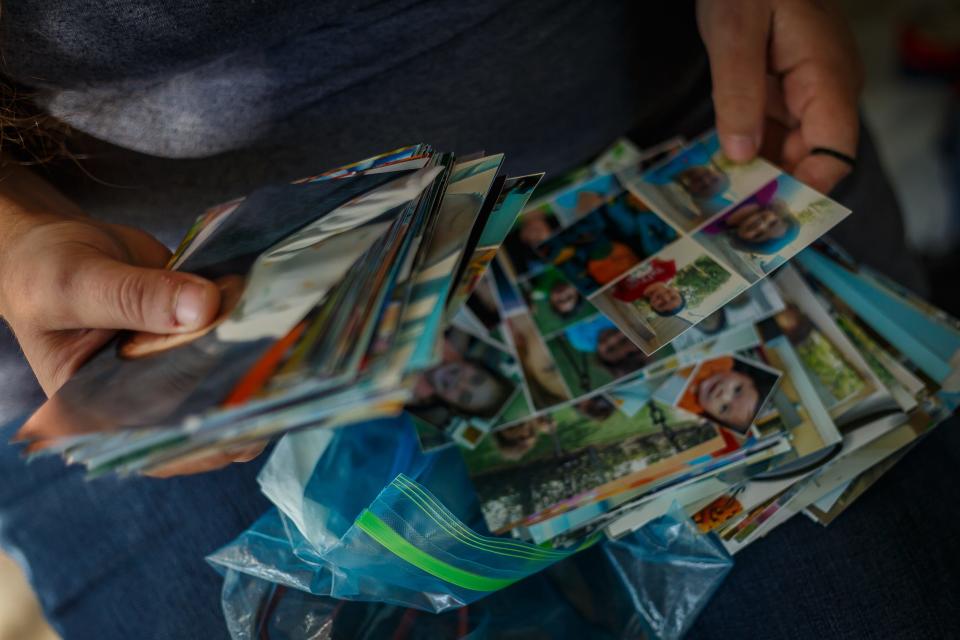
But the reunion would be short-lived. Weeks later, the girls told caseworkers they had visited Pablo at his house. Marion’s new caseworker, a recent college graduate with less than a year on the job, suspected Marion had rekindled her relationship with him, which Marion denies to this day.
Child welfare workers took the girls back. This time, the caseworker tacked on new requirements: more domestic violence counseling and a new psychological evaluation.
Robertson, the guardian ad litem supervisor, was puzzled by the coalition's harsh reaction. Case plans can be complex, and it was common for single moms to return to boyfriends or husbands for help with child care, transportation or emotional support.
“This is a normal part of our work,” Robertson said. “We try to offer realistic help.”
Robertson also worried because child welfare work could be highly subjective. Marion was severely introverted, and she had struggled to connect with her caseworker.
In November 2016, Marion arrived at the psychologist’s office a full hour early for her mental health evaluation. Feeling suddenly claustrophobic in the windowless room, she sped through his questions.
In his report, the psychologist noted that Marion’s affect “remained unchanged” when discussing traumatic events. In his opinion, Marion, “perhaps because of her own history of abuse and neglect, does not register the levels of fear or aversion that might guide her to more actively insulate herself and her children from perpetrators of abuse.”
He deemed the “prognosis” poor.
When it became apparent in late 2017 that Marion was pregnant again, with her ninth child, the coalition was furious that she hid it from them, said people familiar with the case. At court, Marion’s caseworker and coalition lawyers confronted her.
“Just bullying her,” said Kristine Greene, a parenting coach who supported Marion. “Right outside of court.”
They took Marion’s baby, a girl named Maryah weighing just over 4 pounds, two weeks after she was born.
Anonymous tips
Like many women ensnared in the child welfare system, Marion was not accused of injuring her kids. Instead, DCF accused her of something called “failure to protect.”
For years, progressive voices in domestic violence and child welfare have criticized agencies for using the charge “failure to protect" to take children away from their mothers. Critics say it revictimizes women and it is preferable for agencies to work together with mothers on holding batterers accountable.
Many states have followed suit. Not Florida.
In March 2017, caseworkers placed Marion's infant daughter Maryah with Judi Lee, a longtime Sarasota foster parent and former adoption consultant.

During Lee's long history working with the Safe Children Coalition, she clashed with birth families several times, including one case in 2013 that presented such "extreme difficulties" that the coalition temporarily recommended barring Lee from fostering babies, according to her foster parent file.
Licensing records show Lee soon began raising concerns about Marion, sending packets of information to coalition caseworkers about the criminal histories of Marion's associates and reporting that Marion's car did not appear to have enough room for the kids' car seats.
Marion's caseworker's reports, once complimentary of her parenting, took a turn.
In one report, the caseworker said Marion did not appear to be emotionally attached to Maryah because the newborn was in the hospital for 10 days but Marion visited only “a few times and called twice.” In another, the caseworker said she was concerned Marion always brought coloring books and dolls when visiting the girls.
“Would like to see a visit in which the mother does not provide gifts,” the caseworker wrote.
The coalition also tightened the reins on Marion, ordering that only people who had been background-checked and approved could be around the kids. Even though Marion worked overnight, the coalition approved just two women as babysitters. If both were unavailable, Marion was out of luck.
The rules were so strict that when Marion asked the coalition for permission for her landlord’s handyman to fix her kitchen sink, the coalition said no, stating in an email that only a judge could grant that permission. They recommended she wash her dishes in the bathroom.
Then the police began to show up.
The first time was in February 2018, when an anonymous tipster reported that Marion’s baby was “exhausted and dehydrated" and that Marion was driving with all five kids in one car. Police records show investigators closed the case after speaking with the girls who "appeared to be in good spirits and felt safe at home" with plenty of food and water.
Do you have experience with the Florida child welfare system? Tell us more.
Over the next three months, Bradenton police responded to calls for welfare checks on Marion’s apartment at least five more times, according to police records. The checks became so frequent that a dispatch officer in May 2018 asked the coalition whether Marion was being harassed.
“This is, in the last week, at least the third time that you guys called us to go out there,” he said, in the recorded call. “I’m just trying to figure out if there’s somebody making up false accusations calling in anonymous tips that are bogus and not panning out.”
Days later, Marion was pulled over by sheriff’s deputies who said they received a tip she had drugs in her car, according to Marion. Finding nothing, they fined her $250 for having two children strapped into one seat belt, records show.
Two days after that, Marion said she spotted Lee, the foster mother, parked outside her apartment. She chased the car two blocks south and snapped a photo of the license plate.
In an interview several months later, Lee, who declined to name Marion but spoke broadly about her case, admitted she was driving the car but claimed it was a coincidence that she was so close to Marion's apartment. Lee also denied calling the authorities on her.
“The mom is a product of her environment,” Lee said. “This mom hasn’t told the truth since she was three, probably.”
‘Nobody wanted to be accountable’
Now nearly three years into her case, Marion brought her concerns about being harassed to the coalition. But the coalition was more focused on the information the police calls turned up.
In one welfare check, police found an unnamed male babysitter at the house, records show. The coalition suspected it was an old friend of Marion's named Earl Drymon, whose criminal history includes a 1997 conviction for manslaughter. They also suspected a relationship, which Marion denied.
“With Earl, his record, it sucks. It really does suck. ... But he was my friend before state involvement,” Marion said.
In May 2018, the day before a crucial hearing in the case, the coalition met the girls at their school to question them about Drymon. According to the coalition, 10-year-old Ariana said Drymon had spanked her with a belt, but recanted when investigators arrived. No marks were found on the girl.
Still, child protective investigators took Marion’s kids for the third time.
At a hearing the next day, Greene and Robertson rallied around Marion, arguing that she was being subjected to an unprecedented amount of scrutiny.
“I was going whenever I wanted to,” Robertson said. “Case management dropped by, the supervisor dropped by, the therapist dropped by. This mother was getting eyes in her home about nine times a month.”
But both said their supervisors became worried about publicly disagreeing with the coalition.
“(My supervisors) would start saying, ‘It will be hard for you to get a job if you keep sticking up for these parents,’” Greene said. “I said that’s OK, because I can get another job but these parents can’t get another child.”
Weeks after the hearing, Greene said, her supervisor told her she was being let go because she was frequently late on submitting her case notes.
Days later, Robertson's supervisor forced her to resign for looking up Marion’s case in the child welfare database despite no longer being assigned to the case. Neither infraction, Robertson said, is typically disciplined by firing.
The Safe Children Coalition and the Guardian ad Litem association declined to talk about the case, citing confidentiality laws. Calls to Marion's caseworkers went unanswered.
Greene believes they were let go for being too outspoken about a mother the state had long given up on.
“I think nobody wanted to be accountable for anything,” she said.
‘Lack of candor’
Throughout 2018, the Safe Children Coalition built its case.
At one court hearing, the coalition asked a foster mother to testify about seeing Marion drop off a man on the side of the road before picking up baby Maryah for a visit.
They also invited Jim, Marion’s former partner, to talk about how he had seen Marion with Drymon and the kids at a church function. In case notes, the coalition noted Jim was homeless and had not made progress on any of his assigned tasks over the past three years, which Marion had completed long ago. Still, they called him an “active advocate” for coming to court to discuss his concerns with Marion.
Most damning of all, a woman who knew Marion reported that she saw her with Drymon at a local motel and that Drymon had yelled at and shoved the kids, which he denied.
The coalition also called on people to report on other aspects of Marion’s parenting.
A house mother at the girls’ group home said the trio had problems with hygiene: They were not brushing their hair daily. They came back from visits smelling like cigarettes. Sometimes they used conditioner as if it were body wash.
“They came back sunburned once,” she said. “They said Mommy couldn’t afford” sunscreen.
The foster mother for baby Maryah said Marion was late to visits “a lot.”
“I’ve been late for work a couple times as a result,” she testified. “I work 40 hours per week and have a set schedule.”
A woman named Rebecca Dilley from Pinellas County’s Guardian ad Litem office reported that she recently sat the girls down and asked them where they wanted to be in a year.
“With Mom,” said Jackie, 6.
“Here,” said Abby, 9.
“In horsey-land,” said Ariana, 10.
“I tried to get her to explain,” Dilley told the judge. “She just shrugged her shoulders.”
DCF attorney Shea Sandusky pushed Marion on why she was behind on rent, why she had created a GoFundMe page to solicit donations to sue the department, why her driver's license was expired.
“Why couldn’t you make a (GoFundMe) post to ask for help for something as important as your driver’s license?” Sandusky asked.
To the judge, he added: “I think we all know Mom needs something more that we don’t know how to address."
Marion denied all of the accusations. She insisted they were mistaken, that the Safe Children Coalition was after her babies, that the woman in the motel had made it up.
She said she was on an installment plan to pay off her traffic tickets. That there had been “no man” since Pablo. That she was spending nearly $200 a month driving to court hearings and visits with her kids, now spread across three counties. That the coalition had promised her rent assistance, that she had provided her pay stubs more than once, that she had received nothing.
In February 2019, DCF filed a petition to permanently terminate Marion’s rights as a parent and put her kids up for adoption. Marion was not accused of injuring them, using drugs or having any mental health issues. But Marion was guilty of "exposing them to unapproved males," according to case records.
"Reunifying with the mother would be more harmful to the girls than if they moved on to become part of an adoptive family," her caseworker wrote.
The court set a trial date six months out.
‘You’re not my daughter’
Despite working with her for years, there was a lot the coalition never knew about Marion.
Like how Marion's mother whipped her with switches. Beat her with extension cords. Cracked broomsticks over her head.
How Marion's brother touched her for the first time when she was 5. How she finally spoke up when she turned 9. How she was handed a set of dolls she had never seen before, with enormous private parts, and told to show the adults what happened.
How Marion's mother told the judge she was lying.
Marion didn’t speak much after that. Not when she went to foster care. Not when she moved in with an abusive uncle. Not when she showed up for the first day of school and picked the desk in the farthest corner of the classroom because her teacher was a man. Not when she dropped out at 16, saved her money from working at McDonald’s and rented her own apartment, taking cabs to make it to therapy.
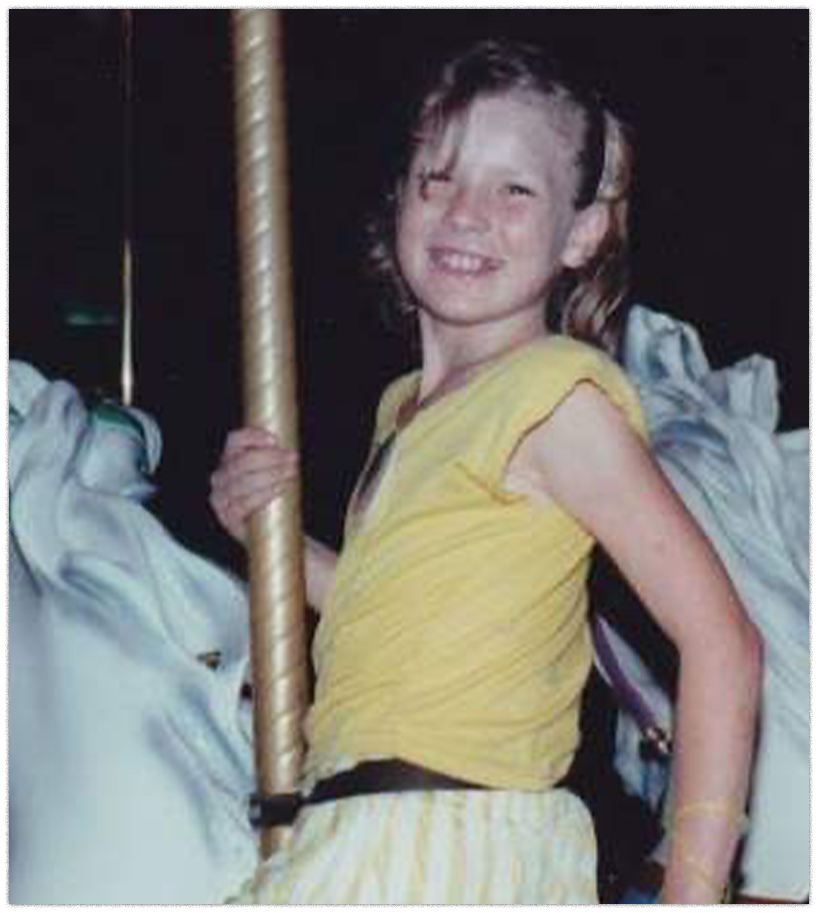
She picked men badly.
There was Jim, who pushed her head into an end table in front of the children, before she grabbed them and ran for the women's shelter. After that was an auto mechanic who stabbed her with a screwdriver and choked her until she passed out. Then Adolfo, who was not physically abusive but was already monitoring who she talked to on the phone.
“I cannot go through this again,” Marion told him. She broke up with him when she was six months pregnant.
She tried her best with the kids. With Jim, disappointment was a constant, a string of broken promises and failed appearances. With the girls, Marion soothed, pleaded, explained: Sometimes grown-ups have things come up. No, she didn’t know where he was. Mommy would take them anywhere they wanted to go. To the store. The beach. The park.
The girls threw tantrums, cried, hit things.
“Please,” she told Jim the next time she saw him. “If you’re going to come by, don’t tell the kids. Because you’re not the one that gets yelled at.”
In 2010, hearing that her mother was on her deathbed, Marion called for the first time in years to try to make amends. The conversation was short.
“You’re not my daughter,” her mother said. “I don’t have no effing daughter.”
Marion doesn't unlock this part of her life. Only at night, and only once in a while, she writes in her journal and cries.
"Everything inside me, it goes into this little ball," she says.
In June 2019, as her trial approached, she got a text from an unknown number.
I miss you mommy
It was Abby. Marion wrote back quickly, almost frantically.
I love you so much and I miss you
Please behave so you do not keep being moved
Always know that god is with you all the time through the good and bad. No matter how hard things get, never give up faith
No longer a mother
The trial took four brutal days, spread out over two weeks and closed to the public. Marion took off work to make it, darting between court and Section 8 appointments.
Five weeks later, the judge emailed her decision: In the eyes of the state, Marion was no longer a mother. The kids would go up for adoption.
That night, Marion sat in her apartment and cried.
“I don’t know how I can hate myself, but I do,” she wrote.
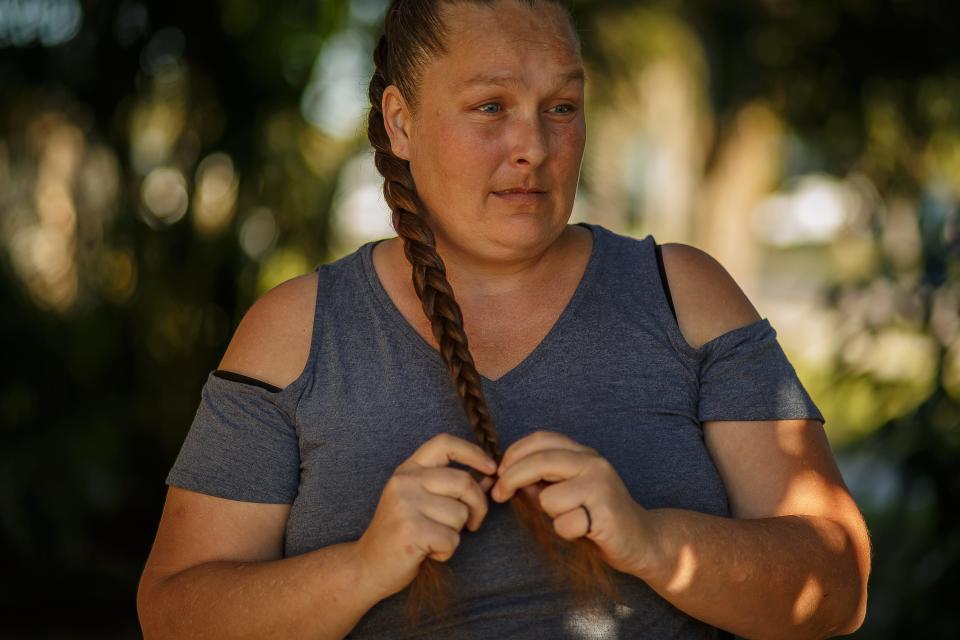
Nearly everybody who had started on the case was gone: Four of Marion's six caseworkers, plus a supervisor, had left the coalition for other jobs. Marion's public defender moved to private practice. Robertson and Greene had been forced out.
The case still haunts Robertson, who grew up poor herself and said Marion’s five-year struggle highlights an uncomfortable truth for child welfare workers: Often, their job is weighing whether to take a child from a loving but flawed family and put them in the arms of wealthy strangers.
“Yes, they would have sushi and hummus and trips to the museum, instead of Mountain Dew and wrestling matches,” Robertson said. But she couldn't help but wonder what would have happened if the state had given a fraction of the stipend they pay to foster parents – more than $400 per child per month – to Marion.
Robertson imagined Marion with a fine apartment, a safe neighborhood, professional babysitters, after-school tutors, a car with room for the kids, a private attorney.
“It will break your heart,” Robertson said. “It will break your brain.”
Marion, who immediately appealed the termination decision, is still waiting for results, delayed by the coronavirus.
In the meantime, she still sends her kids gifts. In the fall, she bought all the girls necklaces with heart-shaped crystals that projected the words “I love you” in 26 languages when held up to a flashlight.
Days later, she got another text from another number.
It is Abigail
I love you mommy
There was so much to say. Marion typed quickly, reminding Abby to memorize mommy's address, telling her to look out for the necklaces soon, asking her to tell her sisters that mommy loved them with all her heart.
You will always be my daughter
No matter what
This article originally appeared on USA TODAY: Florida mother fought for kids, couldn’t please child welfare execs

 money
money 